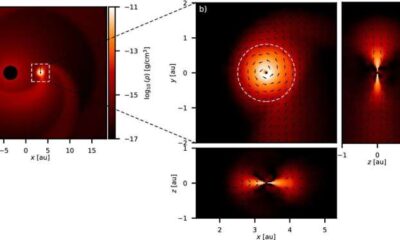World
Natan Sachs Discusses Future of Israel’s Ceasefire Agreement

On March 15, 2024, Natan Sachs, a prominent expert from the Middle East Institute, discussed the implications of the ceasefire agreement in Israel during an interview with NPR’s Leila Fadel. Sachs provided insights into the evolving situation, emphasizing Israel’s strategic considerations in light of recent developments.
Sachs noted that the ceasefire has created a temporary respite for the region, particularly for civilians in Gaza. He pointed out that while the cessation of hostilities is beneficial on the surface, it does not address the underlying issues that led to the conflict. According to Sachs, Israel views the ceasefire as a crucial opportunity to reassess its security strategies and diplomatic relations.
Evaluating the Ceasefire’s Impact on Regional Stability
The ceasefire agreement has been a significant point of discussion within Israeli political circles. Sachs highlighted that the Israeli government is weighing the effectiveness of the ceasefire against the backdrop of ongoing threats. He stated, “Israel is looking for assurances that any future agreements will not only halt violence but also lead to sustainable peace.” This sentiment underscores the cautious approach Israel is taking in negotiations.
Sachs pointed out that the ceasefire has not only impacted military strategies but also humanitarian efforts. With a reduction in hostilities, aid organizations have been able to deliver much-needed support to those affected in Gaza. “The humanitarian aspect cannot be overlooked,” he said, emphasizing the importance of addressing the needs of civilians while navigating complex geopolitical landscapes.
Recent statistics reveal that over 1.5 million individuals in Gaza have been affected by the conflict, with many lacking access to basic necessities. The ceasefire has allowed for some relief, but Sachs cautioned that without a comprehensive plan for peace, the situation remains precarious. The Israeli government is under pressure to ensure that any agreements do not inadvertently empower militant groups.
Future Prospects for Peace and Security
Looking ahead, Sachs expressed skepticism about the longevity of the ceasefire. He pointed out that historical precedents suggest that temporary agreements often lead to renewed violence. “Israel must be strategic and realistic about what these agreements entail,” he said. The Israeli leadership is reportedly focused on achieving long-term stability rather than short-term fixes.
The dialogue surrounding the ceasefire also involves international stakeholders. Sachs indicated that external pressures, particularly from the United States and European nations, may influence Israel’s decisions moving forward. “International diplomacy plays a critical role in shaping the future of this region,” he added.
As discussions continue, the future of the ceasefire agreement remains uncertain. Sachs believes that Israel’s response will be shaped by both internal political dynamics and external diplomatic pressures. The coming weeks will be crucial in determining whether the ceasefire can evolve into a more permanent peace framework or if tensions will resurface.
In conclusion, the insights shared by Natan Sachs highlight the multifaceted nature of the ceasefire deal and its implications for Israel, Gaza, and the broader region. The complexities of achieving lasting peace demand careful consideration and strategic planning from all parties involved.
-

 Science1 month ago
Science1 month agoOhio State Study Uncovers Brain Connectivity and Function Links
-

 Politics1 month ago
Politics1 month agoHamas Chief Stresses Disarmament Tied to Occupation’s End
-

 Science1 month ago
Science1 month agoUniversity of Hawaiʻi Joins $25.6M AI Project for Disaster Monitoring
-

 Entertainment1 month ago
Entertainment1 month agoMegan Thee Stallion Exposes Alleged Online Attack by Bots
-

 Science3 weeks ago
Science3 weeks agoALMA Discovers Companion Orbiting Giant Star π 1 Gruis
-

 Science2 months ago
Science2 months agoResearchers Challenge 200-Year-Old Physics Principle with Atomic Engines
-

 Entertainment1 month ago
Entertainment1 month agoPaloma Elsesser Shines at LA Event with Iconic Slicked-Back Bun
-

 World1 month ago
World1 month agoFDA Unveils Plan to Cut Drug Prices and Boost Biosimilars
-

 Top Stories1 month ago
Top Stories1 month agoFederal Agents Detain Driver in Addison; Protests Erupt Immediately
-

 Entertainment1 month ago
Entertainment1 month agoBeloved Artist and Community Leader Gloria Rosencrants Passes Away
-

 Business1 month ago
Business1 month agoMotley Fool Wealth Management Reduces Medtronic Holdings by 14.7%
-

 Politics2 months ago
Politics2 months agoNHP Foundation Secures Land for 158 Affordable Apartments in Denver









